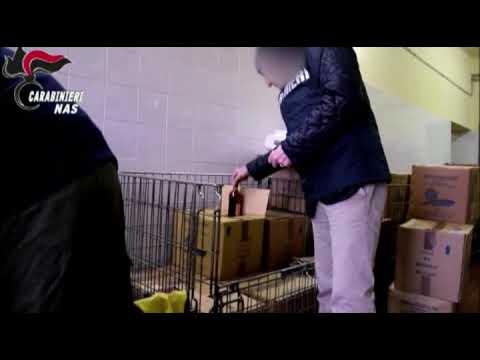Counterfeiting ring for automotive counterfeits curbed
Italian law enforcement agencies have busted a criminal auto parts counterfeiting ring and arrested 29 suspects nationwide, on charges including intellectual property rights infringements and money laundering. Investigations by the Guardia di Finanza and the analysis of digital traces by the authorities had shown that the gang with a criminal company in the central Italian province of Frosinone had purchased electronic components that resembled original parts via Chinese online sellers. The firmware and software of these products were then modified to circumvent the car manufacturers‘ security systems, according to recent media reports. As the counterfeits were sold at prices far below those of the original parts, the authorities suspect that the buyers had been aware that the products were counterfeit.
Tons of foodstuffs seized
Illegal and counterfeit food worth around 28 million euros has been seized worldwide by authorities in the operation Opson IX, coordinated by Interpol and Europol. The officials confiscated about 12,000 tons of illegal goods, dismantled 19 organized crime groups, and arrested 406 suspects. Among others, dairy products, olive oil, and alcohol were in focus; confiscated products for example included more than 1.2 million liters of alcoholic beverages, such as wine. Other products seized frequently included pet food, cereals and cereal products, coffee and tea, and spices. In Spain and Belgium, for example, authorities confiscated large quantities of saffron worth a total of over 306,000 euros. The operation, which ran from December 2019 to June 2020, involved law enforcement agencies from 83 countries*; more than in the previous year’s operation Opson VIII. Also involved were the European Anti-Fraud Office (OLAF), the European Commission, the EU Intellectual Property Office (EUIPO), national regulatory authorities, and private sector partners.
Spain: Customs reports around five million seized counterfeits
In 2019, Spanish customs seized some 4.97 million fakes, with a market value of over 143 million euros. This is reported in the recently published statistics of the Spanish authorities. Counterfeit food and beverages were particularly often seized (about 2.4 million items), followed by clothing (about 471,000 items), and leather goods and accessories (about 87,000 items). The actions against the illegal trade in counterfeit goods mainly took place in warehouses, factories, and shops where the counterfeits were produced or distributed (about 29 percent). In second and third place came seizures at retail outlets (about 12 percent) and actions at customs borders in ports and airports (about 4 percent). The data on counterfeiting offences was evaluated by the Spanish Ministry of the Interior in cooperation with the Spanish trademark rights association Asociación de Defensa de la Marca.
New awareness campaign launched in France
The French business association L’Union des Fabricants (Unifab) is launching a new information and awareness campaign against counterfeiting. With the slogan “Be, Buy, Consume, REAL. United against fakes and piracy” (“Soyez, Achetez, Consommez VRAI. Solidaires contre la contrefaçon et le piratage”), the campaign aims to combat the increase in counterfeiting in France and to raise awareness for the dangers of counterfeiting, particularly among young consumers. Due to the coronavirus pandemic, the campaign is predominantly digital and intends to reach consumers via media such as Facebook and Instagram, Dailymotion, Google, and eBay; moreover, a website has been launched where consumers can inform themselves and test their knowledge of fakes. The digital content will be accompanied by poster campaigns. The initiative is supported by several partners, including the French IP office INPI and the national anti-counterfeiting committee CNAC.






